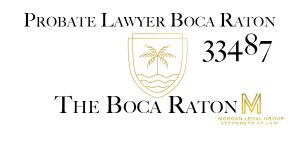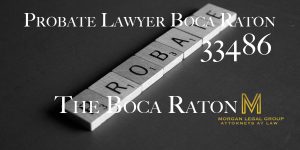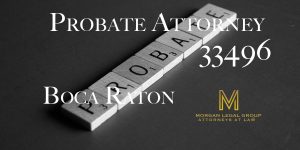When Probate is Not Needed in Florida
Probate is a common concern for many individuals engaged in estate planning. However, not all estates in Florida require probate. Understanding the circumstances under which probate may not be needed is crucial for effective estate planning.
Understanding Probate in Florida
Probate involves validating a will, if one exists, and distributing the deceased person’s assets to beneficiaries. If there’s no will, the court will distribute the assets according to Florida’s intestate succession laws. However, not all assets go through probate. Non-probate assets, such as those held in a living trust or assets with designated beneficiaries like life insurance policies and retirement accounts, bypass the probate process.
Circumstances When Probate May Not Be Needed
Let’s explore the scenarios under which probate might be avoided in Florida:
1. Small Estates
Florida provides a simplified probate process for small estates, known as “summary administration.” If the total value of the estate subject to probate is less than $75,000, or if the decedent has been dead for more than two years, the estate may qualify for summary administration. This streamlined process is generally faster and less costly than formal probate.
However, determining the value of the estate involves considering both probate and non-probate assets. It’s advisable to seek legal advice to accurately assess whether an estate qualifies for summary administration.
2. Joint Ownership with Right of Survivorship
Assets held in joint tenancy with the right of survivorship or tenancy by the entirety automatically pass to the surviving joint owner outside of probate. Common examples include joint bank accounts or real estate owned by spouses. When one owner passes away, the surviving owner becomes the sole owner without the need for probate.
It’s important to note that not all joint ownership structures offer this benefit. Consultation with an experienced estate planning attorney is crucial to ensure assets are titled correctly to avoid probate.
3. Living Trusts
Assets held in a living trust can bypass probate. A living trust is a legal entity that holds and manages assets during the grantor’s lifetime. Upon the grantor’s death, the successor trustee can distribute the assets to beneficiaries without court involvement. Creating a living trust requires careful planning and legal documentation.
While establishing a living trust involves upfront effort and potential costs, it can provide significant benefits in terms of privacy, efficiency, and the ability to avoid probate.
4. Payable-on-Death (POD) Designations
Bank accounts, retirement accounts, and investment accounts often allow for payable-on-death (POD) designations. By naming a specific beneficiary, the asset can be transferred directly to the beneficiary upon the account holder’s death, avoiding probate.
Regular review and updating of POD designations are essential to ensure alignment with current intentions and avoid unintended consequences.
5. Transfer-on-Death (TOD) Designations
Similar to POD designations, assets such as real estate can have transfer-on-death (TOD) designations. By naming a beneficiary, the property can transfer automatically to the designated person upon the owner’s death.
Using TOD designations requires careful consideration of the potential implications and consultation with legal professionals to ensure the proper legal mechanisms are in place.
Seeking Professional Guidance
These circumstances may allow for the avoidance of probate in Florida, but it’s crucial to seek professional guidance for effective estate planning. The expertise of an experienced estate planning attorney can help individuals navigate the complexities of probate laws and determine the most suitable strategies based on their unique circumstances.
At Morgan Legal Group in Miami, our team of knowledgeable attorneys specializes in estate planning and probate matters. We provide personalized and comprehensive legal services to ensure our client’s assets are protected, and their wishes are carried out efficiently.
Understanding whether probate is necessary involves a careful analysis of the estate’s composition, value, and the specific legal mechanisms in place. We work closely with our clients to develop tailored estate plans that align with their goals and provide peace of mind for themselves and their loved ones.
For expert legal advice on probate and estate planning in Florida, contact Morgan Legal Group today. Let our experienced team guide you through the intricacies of the legal system, ensuring that your estate is handled according to your wishes.
Summary of Probate Avoidance Strategies in Florida
| Strategy | Description |
|---|---|
| Small Estates | If the total value of the estate subject to probate is less than $75,000, or if the decedent has been dead for more than two years, the estate may qualify for summary administration. |
| Joint Ownership with Right of Survivorship | Assets held in joint tenancy with the right of survivorship or tenancy by the entirety automatically pass to the surviving joint owner outside of probate. |
| Living Trusts | A living trust is a legal entity that holds and manages assets during the grantor’s lifetime. Upon the grantor’s death, the successor trustee can distribute the assets to beneficiaries without court involvement. |
| Payable-on-Death (POD) Designations | By naming a specific beneficiary, the asset can be transferred directly to the beneficiary upon the account holder’s death, avoiding probate. |
| Transfer-on-Death (TOD) Designations | By naming a beneficiary, the property can transfer automatically to the designated person upon the owner’s death. |
Probate is a common concern for many individuals engaged in estate planning. However, there are certain circumstances under which probate may not be needed in Florida. Understanding these strategies is crucial for effective estate planning. Seeking professional guidance from an experienced estate planning attorney is essential to ensure assets are titled correctly and to develop tailored estate plans that align with the individual’s goals.








